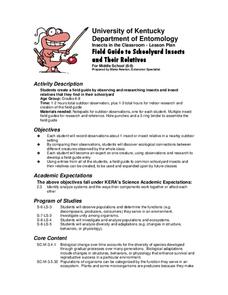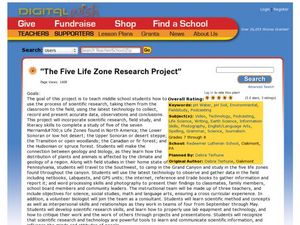Serendip
Evolution and Adaptations
Survival of the fittest isn't just for the movies! A five-part lesson explores several different species with known adaptations and analyzes them for their survival strategies. Using both video and research data, scholars draw...
Serendip
UV, Mutations, and DNA Repair
How effective are cells at repairing UV damage? An inquiry-based lesson has learners experiment with organism by exposing them to various levels of UV light and then examining their DNA after a period of time. Pupils test different...
Serendip
From Gene to Protein via Transcription and Translation
DNA carries the codes for creating just the right protein. A well-designed lesson plan leads pupils through the process from start to finish and everywhere in between. Guiding questions with supporting video help scholars understand the...
Serendip
DNA Structure, Function and Replication
Before a cell replicates, its DNA must replicate. Take advantage of a hands-on guided lesson to teach budding scientists how this happens. Using a set of nucleotide cards, learners become the DNA and work to create matching strands...
Serendip
DNA
Get up close and personal with DNA! A two-part hands-on activity has learners extract DNA from a small organism and then their own cheek cells. Scholars then explore DNA replication using questions to guide their analyses.
Serendip
Learning about Genetic Disorders
Each genetic disorder has its own story to tell. A research-based lesson asks individuals to investigate a genetic disorder using scientific web resources. Guiding questions ask them to explain the mode of inheritance and the effects of...
Serendip
Should You Drink Sports Drinks? When? Why?
New research proves even rinsing your mouth with carbohydrates without swallowing improves performance of the central nervous system. While some think sports drinks are amazing, others say they are a waste of money. Scholars learn about...
Serendip
Vitamins and Health – Why Experts Disagree
Should people take vitamins or get the needed minerals through diet? Experts disagree based on many different factors. Scholars compare study findings and discuss the differences. They learn the importance of comparing results across...
Serendip
How Do Muscles Get the Energy They Need for Athletic Activity?
Every muscle movement requires energy, but where does that energy come from? Scholars answer this question and more as they complete a worksheet. By following the directions, completing research, and discussing it as a class, they begin...
Serendip
Golden Rice – Evaluating the Pros and Cons
More than half the world's population eats rice as a daily staple ... imagine if that rice could prevent illness. Scientists genetically engineered rice to include vitamin A for just that purpose. However, room for debate still exists....
Serendip
The Ecology of Lyme Disease
Areas that previously included no risk of Lyme disease now have cases every year. Scholars learn about the spread of Lyme disease and the relationship with ecological succession. Then, they discuss possible solutions using the known food...
Koshland Science Museum
Infectious Disease: Evolving Challenges to Human Health Middle School Virtual Field Trip
Is there one right way to control infectious diseases? Learners determine the facts each stakeholder must consider when making their recommendations for controlling a disease threatening their area. They take into account public health,...
Serendip
Understanding How Genes Are Inherited via Meiosis and Fertilization
Bring the excitement of genetics to scholars with a dynamic hands-on meiosis modeling experience. During the activity, biologists follow step-by-step procedures to build chromosomes, model independent assortment, learn about crossing...
Curated OER
Rotting Food
Students put bread out on a plate for a few days and put it under a microscope when it begins to mold. In this rotting food lesson plan, students discuss eating old food and what it does to your body.
Curated OER
Field Guide to Schoolyard Insects and Their Relatives
Your entire class works together to create an illustrated insect field guide. The intent is that they venture outside of the classroom, find a critter, and then research it using reference materials, insect books, and the Internet for...
National Science Teachers Association
Adopt-a-Dino
Earth historians research a specific dinosaur, write a paper about the Mesozoic era that it lived in, create an artistic rendition of the environment, and give a presentation in class about what they learned. Be aware that there are...
Shmoop
ELA - Literacy.CCSS.ELA-Literacy.RST.9-10.6
Key to understanding scientific or technical texts is identifying the underlying question the author is attempting to answer. Provide your young scientists with an opportunity to practice identifying these questions and the procedures...
Serendip
How Mistakes in Cell Division Can Result in down Syndrome and Miscarriages
Some genetic conditions occur without being inherited. The distinction becomes the focus of the lesson. It details the process of cell division that results in trisomy on various chromosomes. A worksheet highlights the results including...
Curated OER
The Upper Palouse Restoration Project
Students become competent, to collect, record, and interpret information about a particular project they are undertaking. They apply the data and interpret them to analyze the environmental impact of a restoration project.
Curated OER
Implications of the Human Genome Project
Learners study the Human Genome Project through classroom discussion and the video, Cracking the Code of Life. They research reports about the issues of disease, human health, and the ethical, legal, and societal implications of the...
Curated OER
The Five Life Zone Research Project
Students study five of the seven life zones in North America. In this journalism lesson students use the Scientific Method working in teams. They use lab equipment and technology to create a presentation on five of the seven life zones...
Other popular searches
- Molecular Biology
- Plant Biology
- Biology Lab
- Biology Lesson Plans
- Biology Unit
- Introduction to Biology
- Population Biology
- Biology Crossword
- Biology Calculus
- Biology Vocabulary
- Ap Biology
- Biology Lab Photosynthesis






















